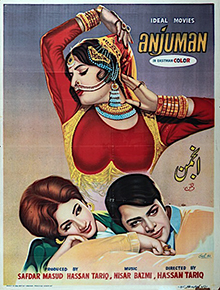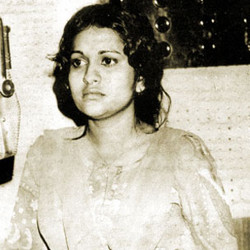
Mehdi Hassan Khan 18 July 1935 – 13 June 2012) was a Pakistani ghazal singer and playback singer for Lollywood. Widely considered one of the greatest and most influential figures in the history of ghazal singing, Hassan is referred to as the "Shahenshah-e-Ghazal". Known for his "haunting" baritone voice, Hassan is credited with bringing ghazal singing to a worldwide audience. He is unique for his melodic patterns and maintaining integrity of the ragas in an innovative way.

Ustad Ghulam Ali is a Pakistani ghazal singer of the Patiala Gharana. He has also been a prominent playback singer in Bollywood. Ghulam Ali was a disciple of Bade Ghulam Ali Khan. Ali was also trained by Bade Ghulam Ali's younger brothers – Barkat Ali Khan and Mubarak Ali Khan.
Habib Wali Mohammad (Urdu: حبِیب ولی محمد), was a Pakistani ghazal and film playback singer.

Nisar Bazmi was a composer and music director of Indian and Pakistan film industry.

Ahmed Rushdi was a versatile Pakistani playback singer and was "an important contributor to the golden age of Pakistani film music." Regarded as one of the greatest singers in South Asia who could sing high tenor notes with ease, he is best known for his versatility and distinctive voice, with complex and dark emotional expressions. Considered as the first pop singer of South Asia, he sang South Asia's first pop song, "Ko Ko Korina", in the 1966 film Armaan.

Naseem Begum, known professionally as Mala, was a Pakistani playback singer of Urdu and Punjabi films.

Arthur Nayyar, commonly known as A. Nayyar, was a Pakistani film playback singer. He started his career in 1974 with a duet song. Nayyar always claimed famous singer Ahmed Rushdi as an important contributor to his career as he learned film playback singing from Rushdi. Nayyar and Akhlaq Ahmed remained dominant playback singers of the Pakistani film industry in the late 1970s and throughout the 1980s.
Asad Amanat Ali Khan was a Pakistani classical vocalist and ghazal singer belonging to the Patiala Gharana tradition of music. In a career spanning 32 years, Khan sang over 1,000 songs for Pakistan Television and movie soundtracks, in addition to performing traditional classical music across the world. He was particularly noted for his command over the ghazal style of singing. Khan was the son of the prominent classical vocalist Ustad Amanat Ali Khan. He was awarded the highest national literary award of Pakistan, the Presidential Pride of Performance, on 23 March 2007 for his significant contributions to classical music.

Anjuman is a Pakistani colour film released on 31 July 1970, starring Waheed Murad, Rani, Deeba, Santosh Kumar, Sabiha Khanam and Lehri. The film was released during the hey days of Murad and became a milestone in his career. The film was produced by Safdar Masud under the banner Ideal Movies and directed by Hassan Tariq, a well-known Pakistani film director.

Andaleeb is a 1969 Pakistani Urdu colour film starring Waheed Murad, Shabnam, Aliya, and Mustafa Qureshi, and Talish. It was a golden jubilee hit directed by Farid Ahmed, produced by Rashid Mukhtar, and music composed by Nisar Bazmi. Andaleeb received 4 Nigar Awards in different categories.

Naseem Begum, was a popular, and well known Pakistani film playback singer. She was known as The Tradegy Queen for singing sorrowful and downhearted songs in films.

Naheed Akhtar is a Pakistani playback singer. She is tagged as the "Nightingale of Pakistan". She was the top Lollywood playback singer during the second half of 70s and 80s. She won 3 Nigar Awards and a Pride of Performance in 2007.

Akhlaq Ahmed was a Pakistani film playback singer and still considered one of the leading voices of the film industry.

Mujeeb Aalam was a Pakistani playback singer who had a short film career. His singing style was a mixture of Mehdi Hassan and Ahmad Rushdi's style. He sang dozens of hit songs in late 1960s. However, he lost his popularity in mid-1970s as more versatile singers like Akhlaq Ahmed and A Nayyar entered Pakistan film industry.
Noel Dias, better known as Saleem Raza, was a Pakistani playback singer. He converted to Islam and started his singing career from Lahore, Pakistan, quickly gaining popularity. Raza was a classically- trained singer and was more famous for singing sad songs. Raza's career suffered due to the rise of singer Ahmed Rushdi in the late 1950s. He left playback singing in 1966 as he lost his popularity with the film composers and moved to Canada where he died in 1983.
M. Ashraf or Muhammad Ashraf was a Pakistani film composer. In the early 1960s, he first started as one member of the music directors duo of Manzoor - Ashraf in the Pakistan film industry.
Syed Suleman, also known as S. Suleman or Sullu Bhai, was a Pakistani film director. He also appeared in Bollywood films with minor roles before migrating to Pakistan and after migration, he directed around forty-eight films in Pakistan film industry, including two Punjabi films between 1961 and 1998.

Rubina Badar was a Pakistani radio, TV, and film singer. She is known for her TV song, "Tum Sung Nainan Laagay".

Aaj Aur Kal is a 1976 Pakistani Urdu language social film produced by Irfan Malik and directed by S. Suleman. The lead cast included Shabnam, Rahat Kazmi, Nisho, Ghulam Mohiuddin, Qavi, and Lehri. The film was a remake of director Nazir Ajmeri's Paigham (1964). Aaj Aur Kal was a diamond jubilee hit at the box office and won 8 Nigar Awards for different categories, including the "best film" of the year.

Saiqa is a 1968 Pakistani Urdu romantic film directed by Laiq Akhtar and produced by Shamim Ara in her debut production under Shamim Ara Productions. The film was based on Razia Butt's novel by the same name. The lead cast included Shamim Ara, Mohammad Ali, Darpan, Lehri, and Zamurrad.















